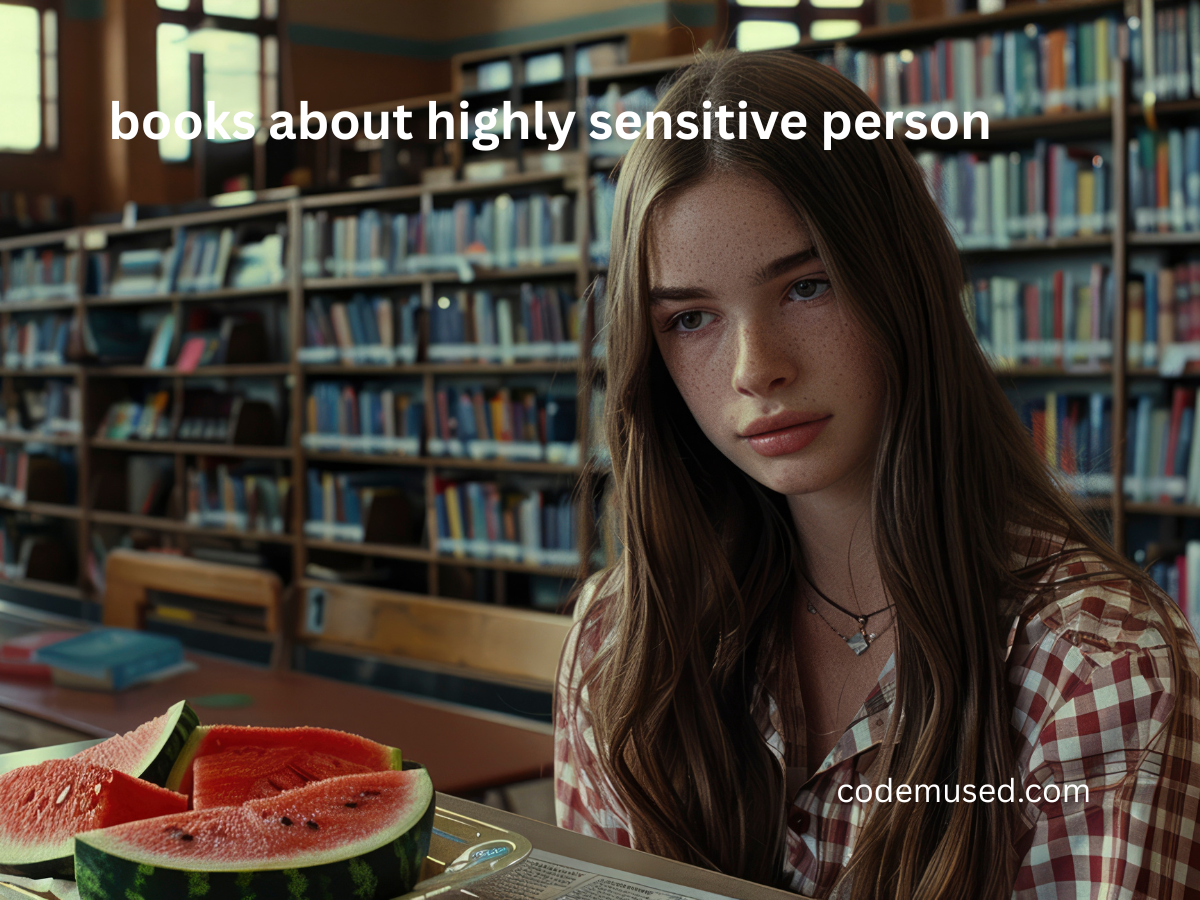Introduction
Books about highly sensitive person will examine the idea of high sensitivity, list some of the best books that address it, and talk about how these books might support books about highly sensitive person in accepting their sensitive side with poise and confidence.
A Highly Sensitive Person (HSP) is who?
In the 1990s, psychologist Dr. Elaine N. Aron popularized the term “books about highly sensitive person” (HSP). People with heightened central nervous system sensitivity to social, emotional, or physical stimuli are known as HSPs. About 15-20% of people have this personality trait, which is not a disorder or ailment.
HSPs frequently encounter:
In-depth mental and emotional processing
High emotional response and empathy
sensitivity to stimuli that affect the senses (strong odors, bright lights, loud noises)
Overstimulation in hectic or disorderly settings
A vibrant and full inner life
The first step in transforming something society frequently misidentifies as a “weakness” into a superpower is realizing how sensitive you are.
Why Read Novels About Extremely Sensitive Individuals?
Reading novels that are specific to their experiences can have a profound impact on HSPs. These publications offer understanding, support, and useful techniques for dealing with the highs and lows of sensitivity. These books help non-HSPs develop empathy and a deeper understanding of friends, coworkers, or loved ones who are sensitive.
Important advantages include
Self-awareness
Recognize how your feelings influence your ideas, actions, and responses.
Coping mechanisms
Learn how to control emotional overload and overstimulation.
Empowerment
Have the self-assurance to respect your emotional demands and set limits.
Relationship advice
Recognize the effects that sensitivity has on both personal and professional connections.
Books on Highly Sensitive Persons (HSP) That You Must Read
Dr. Elaine N. Aron’s The Highly Sensitive Person
The idea of HSPs was first presented to the public in this seminal work. Dr. Aron explains what it means to be extremely sensitive by fusing personal stories with scientific data. A self-assessment quiz, coping mechanisms, and guidance on thriving in a world that frequently feels overwhelming are all included in the book.
Why Read It?
It is the key text for anyone who wants to learn about high sensitivity.
provides a fair assessment of the difficulties and advantages of being an books about highly sensitive person.
Dr. Elaine N. Aron’s The Highly Sensitive Person in Love
Because of their intense emotional needs and need for deep connections, books about highly sensitive person might find relationships challenging. Dr. Aron explores the impact of sensitivity on communication, intimacy, and love relationships in this follow-up book.
Why Read It?
offers advice about dating, marriage, and emotional vulnerability to books about highly sensitive person.
aids non-HSP partners in supporting and understanding their sensitive partners.
Anita Moorjani’s Sensitive Is the New Strong
The book by Anita Moorjani changes the perspective from one that views sensitivity as a weakness to one that celebrates it as a virtue. She talks about her own experiences as an empath and provides resources for using sensitivity for spiritual development and empowerment.
Why Read It?
supports readers in using their sensitivity as a strength.
combines spiritual awakening with personal development for sensitive beings.
Dr. Judith Orloff’s The Empath’s Survival Guide
This book is a must-read for highly sensitive empaths, even though it is not solely about HSPs. Dr. Orloff offers helpful tips for preserving vitality, preventing emotional exhaustion, and surviving in a busy environment.
Why Read It?
Useful advice for coping with sensory and emotional overload.
instructs readers on self-care and boundary-setting.
Susan Cain’s book Quiet
The Power of Introverts in a World That Can’t Stop Talking
Despite being mostly about introversion, books about highly sensitive person find great resonance in Susan Cain’s best-selling book. It questions the extrovert ideal and emphasizes the special contributions that quiet, sensitive people make to society.
Why Read It?
confirms the advantages of books about highly sensitive person and introverts in both life and the workplace.
encourages readers to value their quiet strength in a world full of noise.
Dr. Elaine N. Aron’s The Highly Sensitive Parent
This book provides insightful information on how sensitivity affects parenting practices, emotional control, and connections with children for books about highly sensitive person who are also parents. It’s an empathetic manual for raising kids and looking after oneself.
Why Read It?
emphasizes the special difficulties and rewards of being a sensitive parent.
offers strategies for striking a balance between sensitivity and the responsibilities of parenthood.
How These Books Assist in Turning Sensitivity into Power
Reading literature about HSPs is about transformation, not simply information acquisition. These books are able to:
Verify Your Experiences
Many HSPs experience feelings of being “different” or “too sensitive” from an early age. According to these literature, being sensitive is not a weakness.
Enhance Emotional Well-Being
HSPs can lessen anxiety, overwhelm, and burnout by learning coping strategies and boundary-setting tactics.
Improve Relationships
More genuine, deeper connections can be created by communicating your requirements and being aware of your sensitivities.
Encourage Self-Acceptance
Rather of seeing their sensitivity as a weakness, these books help books about highly sensitive person see it as a special strength.
Questions and Answers (FAQs)
How do an empath and an books about highly sensitive person vary from one another?
Not all books about highly sensitive person are empaths, even though all empaths are extremely sensitive. In particular, empaths experience and absorb other people’s emotions profoundly, whereas HSPs assimilate stimuli deeply and sometimes become overwhelmed by their surroundings. While sensitivity is more general, empathy is more focused on emotional mirroring.
Are anxiety and despair more common in HSPs?
HSPs are particularly vulnerable to overstimulation, which, if improperly handled, can result in tension, anxiety, and even melancholy. HSPs can, nevertheless, enjoy healthy, emotionally satisfying lives if they practice self-care, set boundaries, and have empathy.
Is it possible to outgrow or modify sensitivity?
Being highly sensitive is a personality characteristic rather than a state or stage. Your sensitivity is natural and never goes away, even though you can learn to control your reactions and lessen overload. The objective is to accept and use it constructively rather than to “fix” it.
Do parents and children with high levels of sensitivity have access to any books?
Indeed. Parents of sensitive children should read Dr. Elaine Aron’s book The Highly Sensitive Child. It offers advice on how to support their emotional health and enable them to flourish in social and academic contexts.
Is it possible for HSPs to thrive in demanding professions?
Of course. Many HSPs are excellent in professions like counseling, teaching, design, writing, and healthcare that call for empathy, creativity, and attention to detail. Finding settings that value and encourage their desire for equilibrium and deliberate work is crucial.
Conclusion
Books about highly sensitive person For those who feel intensely in a fast-paced society, books about highly sensitive people are more than just self-help manuals; they are lifelines that provide methods, validation, and a sense of community. These books give you the information and resources you need to turn sensitivity into a powerful strength, whether you’re an HSP looking to better understand yourself or someone who wants to help a sensitive loved one.
You can live a life that is both manageable and incredibly gratifying by accepting your sensitivity, establishing sound limits, and connecting with like-minded people through these articles. After all, being sensitive is a sign of greater empathy, inventiveness, and awareness of the world around you, not a sign of weakness.











